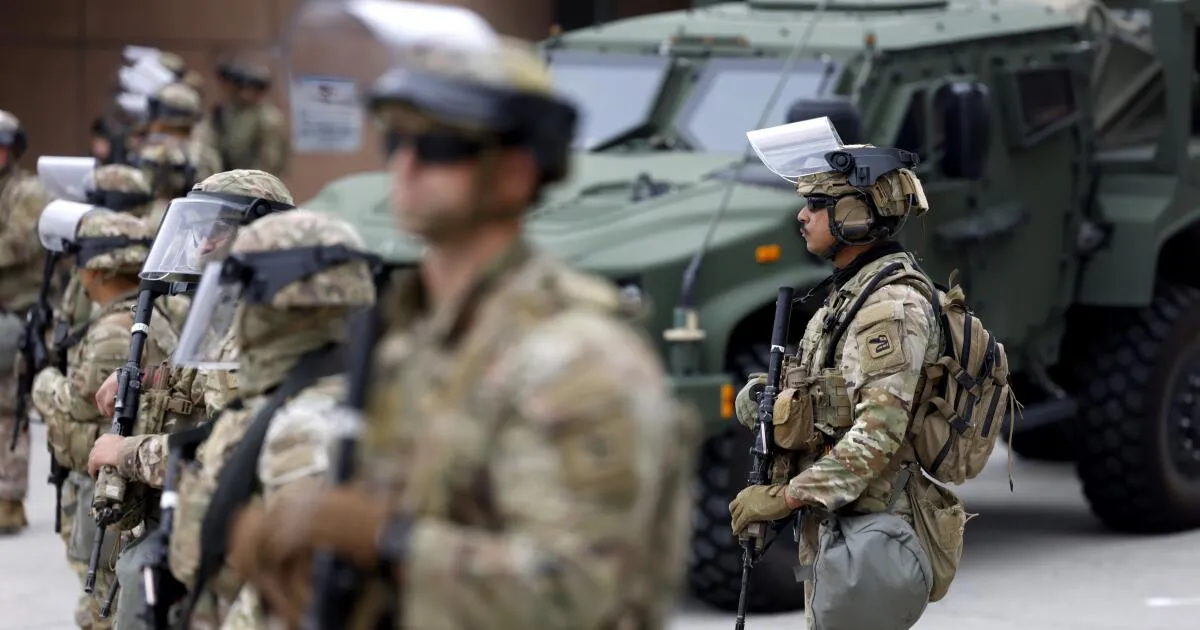
Nearly six weeks into a controversial military deployment, the Pentagon announced on Tuesday that half of the nearly 4,000 National Guard soldiers deployed to the Los Angeles area would be released from duty. This significant decision follows a prolonged legal battle regarding the Trump administration's authority to deploy troops, alongside sharp criticism from state and local leaders who argued that military presence was unnecessary to manage protests related to immigration raids that had resulted in approximately 3,000 arrests.
President Trump defended the military deployment, claiming it was essential due to unrest during the initial days of the immigration sweeps. However, the protests quickly subsided and were primarily managed by local police forces. As a result, the National Guard's role shifted largely to protecting federal buildings rather than addressing civil unrest.
Sean Parnell, a spokesperson for the Pentagon, stated that Defense Secretary Pete Hegseth ordered the release of 2,000 National Guard troops from what was described as a “federal protection mission.” The original deployment was intended for 60 days, potentially extending into early August. Parnell expressed gratitude to the troops, stating, “Thanks to our troops who stepped up to answer the call, the lawlessness in Los Angeles is subsiding.”
Despite the release of 2,000 troops, there are still another 2,000 National Guard members and 700 Marines activated in the Los Angeles area. Upon learning of the troop reduction, California Governor Gavin Newsom called for the complete withdrawal of all remaining military personnel in L.A. He expressed his view on X, stating, “Thousands of members are still federalized in Los Angeles for no reason and unable to carry out their critical duties across the state. End this theater and send everyone home.”
L.A. Mayor Karen Bass, who has consistently criticized the deployment, celebrated what she referred to as the retreat of federalized troops. At a press conference on Tuesday evening, Bass remarked that the troops were “deployed unnecessarily” and were “used as props” by the Trump administration. She characterized the troop reduction as a victory for the city, emphasizing the importance of unity in achieving this outcome: “I am hoping that this is the beginning of a complete withdrawal.”
Some of the National Guard personnel have assisted federal agents in immigration enforcement operations. However, military officials clarified that the troops are limited to security and crowd control and lack law enforcement authority. Their involvement included participation in a convoy that descended on MacArthur Park last week and the operation against cannabis farms in Ventura and Santa Barbara counties.
Earlier in the month, the Trump administration approved a request to release 150 National Guard members from the Los Angeles mission, allowing them to return to their regular duties in combating wildfires. This unit had been operating at only 40% of its standard staffing levels due to the deployment in L.A. Governor Newsom viewed this as a positive development, stating, “Our firefighters are finally returning to fight wildfires. Better late than never. Now — send the rest home.”
In June, U.S. District Judge Charles Breyer of San Francisco ruled that the Trump administration acted unlawfully by mobilizing thousands of California National Guard members against the state’s wishes. In a comprehensive 36-page decision, Breyer concluded that Trump’s actions “were illegal — both exceeding the scope of his statutory authority and violating the 10th Amendment to the United States Constitution.” He expressed concern over the implications of the administration's argument that protests against the federal government, a core civil liberty protected by the First Amendment, could justify a finding of rebellion.
Despite this ruling, the U.S. 9th Circuit Court of Appeals paused the court order, permitting the troops to remain in Los Angeles while the legal proceedings continue. The appellate court acknowledged that while the president has broad authority to deploy military forces in American cities, it is not “unreviewable.”
The decision to release half of the National Guard troops from the Los Angeles area marks a pivotal moment in this ongoing saga of military deployment and civil unrest. As calls for a complete withdrawal intensify from local leaders, the future of military presence in California remains uncertain amid ongoing legal challenges and public scrutiny.